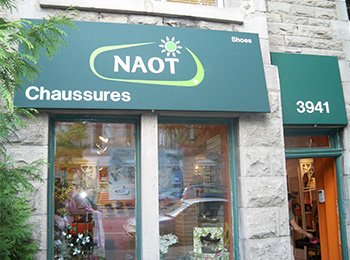MONTREAL — A footwear store on St. Denis Street in Montreal that had been the target of anti-Israel demonstrators for more than three years closed its doors on Nov. 25.
The owners of Chaussures Naot, however, denied that the demonstrations calling for a boycott of Israel were the reason for shutting down.
“It was entirely a business decision,” said Max Lissoos, vice-president of Solemates Inc., the Concord, Ont.-based parent company of Naot.
“St. Denis has become economically depressed. That street has deteriorated from a retail point of view. There was no sense in keeping open when your costs are greater than what you are taking in. If we had been doing OK, we would have stuck it out,” he said.
The store was almost exclusively selling the Naot line of footwear, which is manufactured in Israel at Kibbutz Neot Mordechai in the Upper Galilee.
Naot, at 3941 St. Denis St., opened about four years ago, Lissoos said. Solemates has another Naot store on Monkland Avenue in Notre-Dame-de-Grâce, which remains open and to which the St. Denis outlet’s customer accounts have been transferred.
Lissoos said the NDG store has never been targeted by anti-Israel demonstrators in the decade it has been there, nor have any of the company’s stores elsewhere in Canada. Solemates is the exclusive importer and distributor of the Naot line.
In October 2010, the anti-Israel group PAJU (Palestinian and Jewish Unity) began holding demonstrations every other Saturday outside another shoe store at 4062 St. Denis, Boutique Le Marcheur. PAJU had vowed to make St. Denis, then still a trendy area with chic boutiques and restaurants, an “Israeli apartheid-free zone.”
For a couple of hours, a small number of people held large banners and Palestinian flags denouncing Israel’s treatment of the Palestinians. Occasionally, they were noisy and police were called in, but the demonstrations were deemed legal.
Israeli products were only a very small part of his merchandise, but Le Marcheur owner Yves Archambault stood firm and refused to remove the Israeli products. He was supported by the Jewish community – both official bodies and the grassroots – as well as a number of federal and provincial politicians. Le Marcheur, a long-established company, remains in business.
By February 2011, the demonstrators were dividing their time between Le Marcheur and Naot, and, by June, they were exclusively focused on the latter. They had continued to show up nearly every Saturday.
Anti-boycott demonstrators faithfully turned out to counter those denouncing Israel, but they stopped after about a year.
Naot never received the kind of attention that Le Marcheur did, and awareness of the ongoing demonstrations outside Naot had fallen away.
Lissoos does not deny that the demonstrations on the sidewalk in front of the small shop could have had an impact on business.
The Lissoos family had fought for some kind of legal or political action to stop the demonstrators.
In March 2011, Soulmates appealed directly to then-premier Jean Charest to intervene.
“This activity can only be described as a form of economic terrorism,” Lissoos wrote at the time.
“We have been confronted with a group of aggressive and abusive activists… interfering with shoppers, our staff and passersby on the street, demanding that our store should be boycotted as we sell products produced in Israel.”
In May 2012, Solemates president Corinne Lissoos wrote to The CJN about the weekly demonstrations: “My business, and those of my neighbours, has been and continues to be severely affected by this ongoing harassment, resulting in the loss of jobs.” The store had employed about 10 people.
Several telephone messages were left by The CJN with PAJU president Bruce Katz for comment. He did not respond, nor did PAJU respond to a message left on its website.
